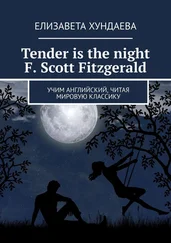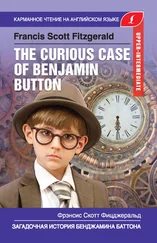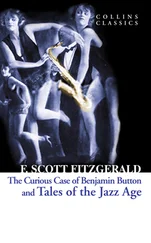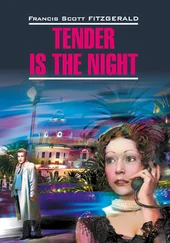Finally, passing through an alley which had been recommended to him as a short cut, he saw before him a man lighting a cigarette. By the flickering match he noticed the whiskers. He stopped dead in his tracks, afraid that it might not be the Duke. The man lit another cigarette. Sure enough, the sideburns, eyeglasses and the whole face proved the question without a doubt.
Garland walked towards the man. The man looked back at him and started to walk in the opposite direction. Garland started to run; the man looked over his shoulder and started to run also. Garland slowed down. The man slowed down. They emerged upon Broadway in the same relative position and the man started north. Forty feet behind, in stolid determination, walked Garland without his hat. He had left it in the alley.
For eight blocks they continued, the man behind being the pacemaker. Then the Duke spoke quietly to a policeman and when Garland, lost in an obsession of pursuit, was grabbed by the arm by a blue-coated Gorgas, he saw ahead of him the Duke start to run. In a frenzy he struck at the policeman and stunned him. He ran on and in three blocks he had made up what he had lost. For five more blocks the Duke continued, glancing now and then over his shoulder. On the sixth block he stopped. Garland approached him with steady step. He of the side whiskers was standing under a lamp post. Garland came up and put his hand on his shoulder.
“Your Grace.”
“What’s dat?” said the Duke, with an unmistakable east-side accent. Garland was staggered.
“I’ll grace you,” continued the side burns aggressively. “I saw you was a swell and I’d a dropped you bad only I’m just out of jail myself. Now listen here. I’ll give you two seconds to get scarce. Go on, beat it.”
Garland beat it. Crestfallen and broken-hearted he walked away and set off for Mirabel’s. He would at least make a decent ending to a miserable quest. A half an hour later he rang the bell, his clothes hanging on him like a wet bathing suit.
Mirabel came to the door cool and fascinating.
“Oh Doddy,” she exclaimed. “Thank you so much. Dukey,” and she held up a small white poodle which she had in her arms, “came back ten minutes after you left. He had just followed the mail man.”
Garland sat down on the step.
“But the Duke of Matterlane?”
“Oh,” said Mirabel, “he comes tomorrow. You must come right over and meet him.”
“Im afraid I can’t,” said Garland, rising feebly, “previous engagement.” He paused, smiled faintly and set off across the sultry moon-lit pavement.
— ◆ —
Nassau Literary Magazine (April 1915)
( The scene is the interior of a wine shop in Paris. The walls are lined on all sides by kegs, piled like logs. The ceiling is low and covered with cobwebs. The midafternoon sun filters dejectedly through the one-barred window at the back. Doors are on both sides; one, heavy and powerful, opens outside; the other, on the left, leads to some inner chamber. A large table stands in the middle of the room backed by smaller ones set around the walls. A ship’s lamp hangs above the main table.
As the curtain rises there is knocking at the outside door—rather impatient knocking—and almost immediately Pitou, the wine dealer, enters from the other room and shuffles toward the door. He is an old man with unkempt beard and dirty corduroys. )
Pitou : Coming, coming—Hold tight! ( The knocking stops. Pitou unlatches the door and it swings open. A man in a top hat and opera cloak enters. Jaques Chandelle is perhaps thirty-seven, tall and well groomed. His eyes are clear and penetrating, his chin, clean shaven, is sharp and decisive. His manner is that of a man accustomed only to success but ready and willing to work hard in any emergency. He speaks French with an odd accent as of one who knew the language well in early years but whose accent had grown toneless through long years away from France. )
Pitou : Good afternoon, Monsieur.
Chandelle : ( looking about him curiously ) Are you perhaps Monsieur Pitou?
Pitou : Yes, Monsieur.
Chandelle : Ah! I was told that one would always find you in at this hour. ( He takes off his overcoat and lays it carefully on a chair ) I was told also that you could help me.
Pitou : ( puzzled ) I could help you?
Chandelle : ( Sitting down wearily on a wooden chair near the table ) Yes, I’m a—a stranger in the city—now. I’m trying to trace someone—someone who has been dead many years. I’ve been informed that you’re the oldest inhabitant ( he smiles faintly )
Pitou : ( rather pleased ) Perhaps—and yet there are older than I, ah yes, older than I. ( He sits down across the table from Chandelle. )
Chandelle : And so I came for you. ( He bends earnestly over the table toward Pitou. ) Monsieur Pitou, I am trying to trace my father.
Pitou : Yes.
Chandelle : He died in this district about twenty years ago.
Pitou : Monsieur’s father was murdered?
Chandelle : Good God, no! What makes you think that?
Pitou : I thought perhaps in this district twenty years ago, an aristocrat—
Chandelle : My father was no aristocrat. As I remember, his last position was that of waiter in some forgotten cafe. ( Pitou glances at Chandelle’s clothes and looks mystified. ) Here I’ll explain. I left France twenty-eight years ago to go to the states with my uncle. We went over in an immigrant ship, if you know what that is.
Pitou : Yes: I know.
Chandelle : My parents remained in France. The last I remember of my father was that he was a little man with a black beard, terribly lazy—the only good I ever remember his doing was to teach me to read and write. Where he picked up that accomplishment I don’t know. Five years after we reached America we ran across some newly landed French from this part of the city, who said that both my parents were dead. Soon after that my uncle died and I was far too busy to worry over parents whom I had half forgotten anyway. ( He pauses. ) Well to cut it short I prospered and—
Pitou : ( deferentially ) Monsieur is rich—‘tis strange—‘tis very strange.
Chandelle : Pitou, it probably appears strange to you that I should burst in on you now at this time of life, looking for traces of a father who went completely out of my life over twenty years ago.
Pitou : Oh—I understood you to say he was dead.
Chandelle : Yes he’s dead, but ( hesitates ) Pitou, I wonder if you can understand if I tell you why I am here.
Pitou : Yes, perhaps.
Chandelle : ( very earnestly ) Monsieur Pitou, in America the men I see now, the women I know all had fathers, fathers to be ashamed of, fathers to be proud of, fathers in gilt frames, and fathers in the family closet, Civil War fathers, and Ellis Island fathers. Some even had grandfathers.
Pitou : I had a grandfather. I remember.
Chandelle : ( interrupting ) I want to see people who knew him, who had talked with him. I want to find out his intelligence, his life, his record. ( Impetuously ) I want to sense him—I want to know him—
Pitou : (interrupting) What was his name?
Chandelle : Chandelle, Jean Chandelle.
Pitou : ( quietly ) I knew him.
Chandelle : You knew him?
Pitou : He came here often to drink—that was long ago when this place was the rendezvous of half the district.
Читать дальше












